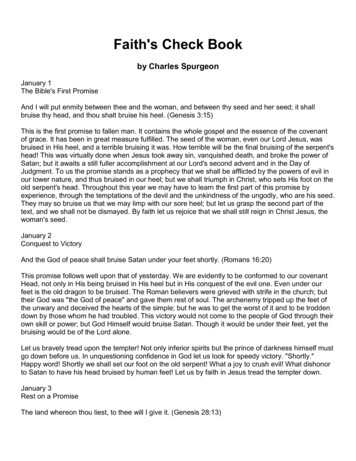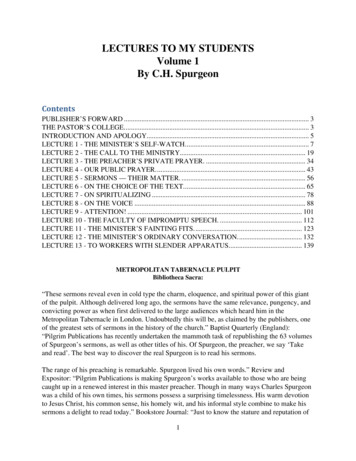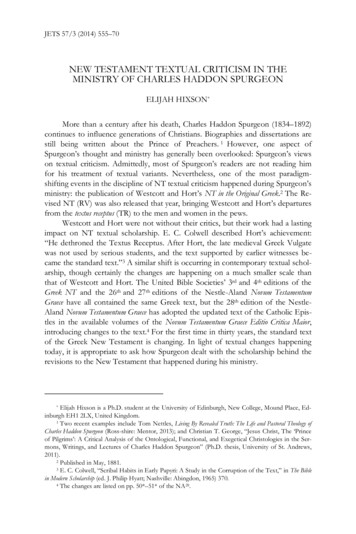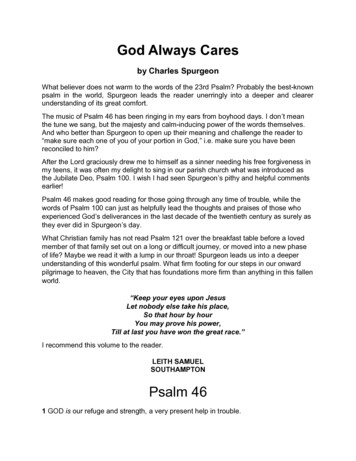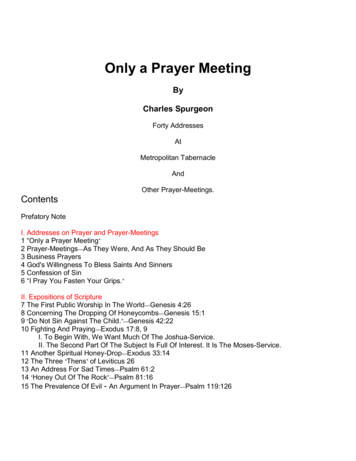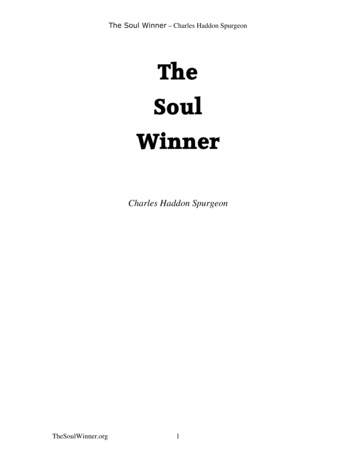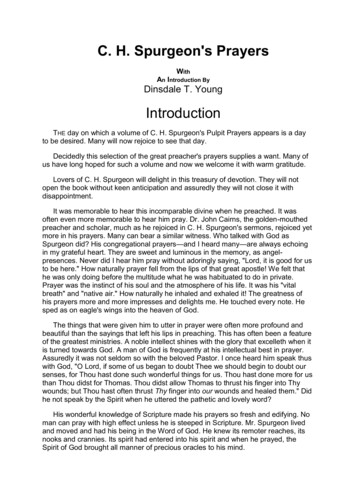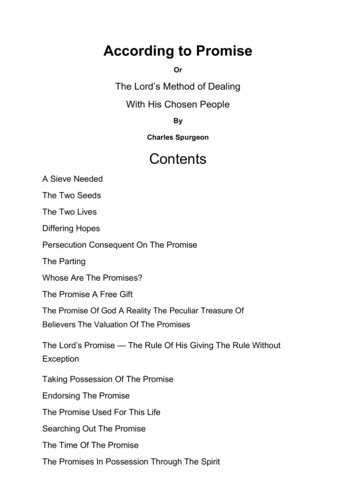
Transcription
According to PromiseOrThe Lord’s Method of DealingWith His Chosen PeopleByCharles SpurgeonContentsA Sieve NeededThe Two SeedsThe Two LivesDiffering HopesPersecution Consequent On The PromiseThe PartingWhose Are The Promises?The Promise A Free GiftThe Promise Of God A Reality The Peculiar Treasure OfBelievers The Valuation Of The PromisesThe Lord’s Promise — The Rule Of His Giving The Rule WithoutExceptionTaking Possession Of The PromiseEndorsing The PromiseThe Promise Used For This LifeSearching Out The PromiseThe Time Of The PromiseThe Promises In Possession Through The Spirit
Jesus And The PromisesA Sieve NeededIT is very important to be able to distinguish between things that differ, forappearances are not to be relied upon. Things which seem to be alike may yet be theopposite of each other. A scorpion may be like an egg, and a stone like a piece ofbread; but they are far from being the same. Like may be very unlike. Especially isthis the case in spiritual things, and therefore it behooves us to be on our guard.It would be very difficult to say how far a man may go in religion, and yet die in hissins; how much he may look like an heir of heaven, and yet be a child of wrath. Manyunconverted men have a belief which is similar to faith, and yet it is not true faith.Certain persons exhibit pious affections which have the warmth of spiritual love, butare quite destitute of gracious life. Every grace can be counterfeited, even as jewelscan be imitated. As paste gems are wonderfully like the real stones, so sham gracesare marvelously like the work of the Spirit of God. In soul matters a man will need tohave all his wits about him, or he will soon deceive his own heart. It is to be fearedthat many are already mistaken, and will never discover their delusion till they lift uptheir eyes in the world of woe, where their disappointment will be terrible indeed.The dead child of nature may be carefully washed by its mother, but this will notmake it the living child of grace. The life of God within the soul creates an infinitedifference between the man who has it and the man who has it not; and the point is,to make sure that we have this life.ARE YOU SURE THAT YOU HAVE IT?It will be an awful thing to cry, “Peace, peace,” where there is no peace, and toprophesy smooth things for yourself, and make your heart easy, and lull yourconscience to slumber, and never to wake out of the sleep till a clap of the thunder ofjudgment shall startle you out of presumption into endless horror.I desire to help my reader in the business of self-examination. I would have him gofurther than examination, and attain to such abundance of grace, that his holy andhappy state shall become a witness to himself.The first part of this little book is meant to be a sieve to separate the chaff from thewheat. Let my friend use it upon himself; it may be the best day’s work he has everdone. He who looked into his accounts and found that his business was a losing onewas saved from bankruptcy. This may happen also to my reader. Should he,however, discover that his heavenly trade is prospering, it will be a great comfort tohim. No man can lose by honestly searching his own heart.FRIEND, TRY IT AT ONCE.The Two Seeds
“It is written, that Abraham had two sons, the one by a bond-maid theother by a freewoman. But he who was of the bond-woman was bornafter the flesh; but he of the freewoman was by promise.”— Galatians 4:22, 23.ABRAHAM had two sons. Ishmael and Isaac were beyond all dispute veritable sonsof Abraham. Yet, one of them inherited the covenant blessing, and the other wassimply a prosperous man of the world. See how close these two were together!They were born in the same society, called the same great patriarch “father,” andsojourned in the same encampment with him. Yet, Ishmael was a stranger to thecovenant, while Isaac was the heir of the promise. How little is there in blood andbirth!A more remarkable instance than this happened a little afterwards; for Esau andJacob were born of the same mother, at the same birth, yet is it written, “Jacob have Iloved, and Esau have I hated.” One became gracious, and the other profane. Soclosely may two come together, and yet so widely may they be separated! Verily, it isnot only that two shall be in one bed, and the one shall be taken, and the other left;but, two shall come into the world at the same moment, and yet one of them will takeup his inheritance with God, and the other will for a morsel of meat sell his birthright.We may be in the same church, baptized in the same water, seated at the samecommunion table, singing the same psalm, and offering the same prayer; and yet wemay be of two races as opposed as the seed of the woman and the seed of theserpent.Abraham’s two sons are declared by Paul to be the types of two races of men, whoare much alike, and yet widely differ. They are unlike in their origin. They were bothsons of Abraham; but Ishmael, the child of Hagar, was the offspring of Abraham uponordinary conditions: he was born after the flesh. Isaac, the son of Sarah, was notborn by the strength of nature; for his father was more than a hundred years old, andhis mother was long past age. He was given to his parents by the Lord, and was bornaccording to the promise through faith. This is a grave distinction, and it marks off thetrue child of God from him who is only so by profession. The promiselies at the bottom of the distinction, and the power which goes to accomplish thepromise creates and maintains the difference. Hence the promise, which is ourinheritance, is also our test and touchstone.Let us use the test at once by seeing whether we have been wrought upon by thepower which fulfills the promise. Let me ask a few questions, — How were youconverted? Was it by yourself, by the persuasion of men, by carnal excitement; orwas it by the operation of the Spirit of God? You profess to have been born again.Whence came that new birth? Did it come from God in consequence of his eternalpurpose and promise, or did it come out of yourself? Was it your old nature trying todo better, and working itself up to its best form? If so, you are Ishmael. Or was it thatyou, being spiritually dead, and having no strength whatever to rise out of your lostestate, were visited by the Spirit of God, who put forth his divine energy, and causedlife from heaven to enter into you? Then you are Isaac. All will depend upon thecommencement of your spiritual life, and the source from which that life at first
proceeded. If you began in the flesh, you have gone on in the flesh, and in the fleshyou will die.Have you never read, “That which is born of the flesh is flesh”? Before long the fleshwill perish, and from it you will reap corruption. Only “that which is born of the Spirit isspirit”; the joy is that the spirit will live, and of it you will reap life everlasting. Whetheryou are a professor of religion or not, I beseech you, ask yourself — Have I felt thepower of the Spirit of God?Is the life that is within you the result of the fermentation of your own naturaldesires? Or is it a new element, infused, imparted, implanted from above? Is yourspiritual life a heavenly creation? Have you been created anew in Christ Jesus?Have you been born again by divine power?Ordinary religion is nature gilded over with a thin layer of what is thought to be grace.Sinners have polished themselves up, and brushed off the worst of the rust and thefilth, and they think their old nature is as good as new. This touching-up andrepairing of the old man is all very well; but it falls short of what is needed. You maywash the face and hands of Ishmael as much as you please, but you cannot makehim into Isaac. You may improve nature, and the more you do so the better forcertain temporary purposes; but you cannot raise it into grace. There is a distinctionat thevery fountain-head between the stream which rises in the bog of fallen humanity,and the river which proceeds from the throne of God.Do not forget that our Lord himself said, “Ye must be born again.” If you have notbeen born again from above, all your church-going, or your chapel-going, stands fornothing. Your prayers and your tears, your Bible-readings and all that have comefrom yourself only, can only lead to yourself. Water will naturally rise as high as itssource, but no higher: that which begins with human nature will rise to human nature;but to the divine nature it cannot reach. Was your new birth natural or supernatural?Was it of the will of man or of God? Much will depend upon your answer to thatquestion.Between the child of God and the mere professor there is a distinction as to origin ofthe most serious sort. Isaac was born according to promise. Ishmael was not ofpromise, but of the course of nature. Where nature’s strength suffices there is nopromise; but when human energy fails, the word of the Lord comes in. God had saidthat Abraham should have a son of Sarah; Abraham believed it, and rejoiced therein,and Isaac was born as the result of the divine promise, by the power of God. Therecould have been no Isaac if there had been no promise, and there can be no truebeliever apart from the promise of grace, and the grace of the promise.Gentle reader, here let me inquire as to your salvation. Are you saved by what youhave done? Is your religion the product of your own natural strength? Do you feelequal to all that salvation may require? Do you conclude yourself to be in a safeand happy condition because of your natural excellence and moral ability? Then
you are after the manner of Ishmael, and to you the inheritance will not come; for itis not an inheritance according to the flesh, but according to promise.If, on the other hand, you say, —“My hope lies only in the promise of God. He has set forth that promise in theperson of his Son Jesus to every sinner that believeth in him; and I do believe inhim, therefore I trust and believe that the Lord will fulfill his promise and bless me.I look for heavenly blessedness, not as the result of my own efforts, but as the giftof God’s free favor. My hope is fixed alone upon the free and gratuitous love ofGod to guilty men, by the which he has given his Son Jesus Christ to put away sin,and to bring in everlasting righteousness for those who deserve it not,”— then this is another sort of language from that of the Ishmaelites, who say “Wehave Abraham to our father.” You have now learned to speak as Isaac speaks. Thedifference may seem small to the careless, but it is great indeed. Hagar, the slavemother, is a very different person from Sarah, the princess. To the one there is nocovenant promise, to the other the blessing belongs for evermore. Salvation by worksis one thing; salvation by grace is another. Salvation by human strength is farremoved from salvation by divine power: and salvation by our own resolve is theopposite of salvation by the promise of God.Put yourself under this inquiry, and see to which family you belong. Are you ofIshmael or of Isaac?If you find that you are like Isaac, born according to the promise, remember that yourname is “Laughter”; for that is the interpretation of the Hebrews name Isaac. Takecare that you rejoice with joy unspeakable and full of glory. Your new birth is awonderful thing. If both Abraham and Sara laughed at the thought of Isaac, you maycertainly do so concerning yourself. There are times when, if I sit alone and think ofthe grace of God to me, the most undeserving of all his creatures, I am ready tolaugh and cry at the same time for joy that ever the Lord should have looked in loveand favor upon me. Yes, and every child of God must have felt the working of thatIsaac nature within his soul, filling his mouth with laughter, because the Lord hathdone great things for him.Mark well the difference between the two seeds, from their very beginning.Ishmael comes of man, and by man. Isaac comes by God’s promise. Ishmael is thechild of Abraham’s flesh. Isaac is Abraham’s child, too; out then the power of God comesin, and from the weakness of his parents it is made clear that he is of the Lord, — a giftaccording to promise. True faith is assuredly the act of the man who believes; truerepentance is the act of the man who repents; yet both faith and repentance may withunquestionable correctness be described as the work of God, even as Isaac is the son ofAbraham and Sarah, and yet he is still more the gift of God.The Lord our God, who bids us believe, also enables us to believe. All that we doacceptably the Lord worketh in us; yea, the very will to do it is of his working. Noreligion is worth a farthing which is not essentially the outflow of the man’s own heart;and yet it must beyond question be the work of the Holy Ghost who dwells within him.
O friend, if what you have within you is natural, and only natural, it will not save you!The inward work must be supernatural; it must come of God, or it will miss thecovenant blessing. A gracious life will be your own, even as Isaac was truly the childof Abraham; but still more it will be of God; for “Salvation is of the Lord.” We must beborn from above. Concerning all our religious feelings and actions, we must be ableto say, “Lord, thou hast wrought all our works in us.”The Two Lives“Neither, because they are the seed of Abraham, are they all children: but,In Isaac shall thy seed be called. That is, They which are the children of theflesh, these are not the children of God: but the children of the promise arecounted for the seed. For this is the word of promise. At this time will Icome, and Sarah shall have a son.”— Romans 9:7, 8, 9.ISHMAEL and Isaac differed as to origin, and hence there was a difference in theirnature which showed itself in their lives, and was chiefly seen in their relation to thepromise.According to the birth so will be the life which comes of it. In the case of the man whois only what he made himself to be, there will be only what nature gives him; but inthe case of the man who is created anew by the Spirit of God, there will be signsfollowing. “Of him are ye in Christ Jesus, who of God is made unto us wisdom, andrighteousness, and sanctification, and redemption: as it is written, He that glorieth, lethim glory in the Lord.” There will be in the new-born man that which the new lifebrings with it: in the natural man there will be nothing of the kind.Ishmael exhibited certain of the natural characteristics of Abraham joined with thoseof his slave mother. He was a princely man like his father, and inherited thepatriarch’s noble bearing; but Isaac had the faith of his father, and was in thesuccession as to holy inward spiritual life. As the heir of the promise, Isaac remainswith his father Abraham, while Ishmael is forming camps of his own in thewilderness. Isaac seeks alliance with the olden stock in Mesopotamia; but Ishmael’smother takes him a wife out of Egypt, which was very natural, since she came fromEgypt herself. Like will to like. Isaac meditated in the field at eventide, for hisconversation was with sacred things; but Ishmael contended with all comers, for heminded earthly things. Meditation is not for the wild man, whose hand is againstevery man, and every man’s hand against him. Isaac surrendered himself as asacrifice to God; but you see nothing of that kind in Ishmael.Self-sacrifice is not for Ishmael; he is rather a killer and a slayer than a lamb thatpresents itself to God. So you shall find, that if you are religiously trained and tutored,and become “pious,” as they call it, and yet are not renewed in heart, nor visited bythe Holy Ghost, you will not live the secret life of the child of God. You may showmany of the outward marks of a Christian; you may be able to sing, and to pray, andto quote Scripture, and perhaps to tell some little bits of imaginary experience; butyou must be born again to know in very deed and truth the fellowship of the saints,
communion in secret with the living God, and the yielding of yourself to him as yourreasonable service. The child of the promise abides with God’s people, and counts ithis privilege to be numbered with them. The child of the promise feels that he is in thebest company when no man can see or be seen, but when the Great Invisible drawsnear to him and holds converse with him. The child of the promise, and he only, isable to go up to the top of Moriah, there to be bound upon the altar, and to yieldhimself up to God. I mean by this last, that only he who is born of the Spirit will yieldhimself wholly to God, and love the Lord better than life itself. Your nature andconduct will be according to your origin; and therefore I pray that you may beginaright, so that as you profess to be a child of the kingdom, you may prove to be atrue-born heir.Ishmael, who was born after the flesh, the child of the bond-woman, must alwaysbear the servile taint. The child of a slave is not free-born. Ishmael is not, cannot be,what Isaac is — the child of the free woman. Now mark: I do not say that Ishmaelever desired to be like Isaac; I do not say that he felt himself to be a loser bydiffering from Isaac; but, indeed, he was so.The man who is laboring for self-salvation by his own doings, feelings, and selfdenials, may be proudly ignorant of his servile state; he may even boast that he wasborn free, and was never in bondage to any; and yet he spends his whole life inservitude. He never knows what liberty means, what content means, what delight inGod means. He wonders when men talk about “full assurance of faith.” He judgesthat they must be presumptuous. He has scarcely time to breathe between the cracksof the whip. He has done so much, but he must do so much more; he has suffered somuch, but he must suffer so much more. He has never come into “the rest whichremaineth for the people of God;” for he is born of the bond-woman, and his spirit isever in bondage. On the other hand, he that is born of the free woman, andunderstands that salvation is of the grace of God from first to last, and that whereGod has given his grace he does not take it back, for “the gifts and calling of God arewithout repentance” — such a man accepting the finished work of Christ, andknowing his acceptance in the Beloved, rests in the Lord, and rejoices exceedingly.His life and his spirit are filled with joy and peace, for he was born free, and he isfree, yea, free indeed.Does my reader understand the freedom of the child of God? or is he still in servitudeunder the law, afraid of punishment, afraid of being sent away into the wilderness? Ifyou are in this latter case, you have not received the promise, or you would know thatsuch a thing could not be. To Isaac, the child of the promise, the heritage belongs,and he abides for ever, without fear of being cast out.Those that are born as Ishmael was, according to the flesh, and whose religion is amatter of their own power and strength, mind earthly things, as Ishmael did. Onlythose that are born from above through the promise according to faith will, like Isaac,mind heavenly things. See how the naturally religious man minds earthly things. He isvery regular at his place of worship; but while he is there he thinks of his business,his house, or his farm. Does he enjoy the worship of God? Not he! There is a
sermon. Does he receive with meekness the engrafted word which is able to save hissoul? Not he! He criticizes it as if it were a political harangue. He gives his money tothe cause of God as others do. Of course he does; for he feels that he has to quiethis conscience, and to keep up his good repute: but does he care for the glory ofGod? By no means. If he did he would give more than money. His heart’s prayerswould go up for the progress of the kingdom. Does he sigh and cry because of thesins of the times? Do you find him alone with God pouring out his heart in anguishbecause even in his own family there are those that are not converted to God? Didyou ever see in him a high and holy joy when sinners are converted — an exultationbecause the kingdom of Christ is coming? Oh no, he never rises to that. All theservice of God is outward to him: into the core and heart of spiritual things he hasnever entered, and he never can. The carnal mind, even when it is religious, is stillenmity against God, and it is not reconciled to God, neither indeed can it be. Theremust be a spiritual mind created in the man, he must become a new creature inChrist Jesus, before he can appreciate, understand, and enjoy spiritual things.To come back to where we started: “Ye must be born again.” We must be born of theSpirit: we must receive a supernatural life by being quickened from our death in sin.We cannot bear the fruit of the Spirit till we have the inner life of the Spirit. Ishmaelwill be Ishmael; and Isaac will be Isaac. As the man is, such will his conduct be. Theman of sight, and reason, and human power, may do his best as Ishmael did; butonly the child of the promise will rise to the life and walk of faith as Isaac did.“Hard lines,” says one. Sometimes it is a great blessing to have those hard linesdrawn, and drawn very straight, too. By this means we may be set on the right trackfor eternity. One said the other day to a friend of mine, “I once went to hear Mr.Spurgeon, and when I went into the Tabernacle if you had asked me about myself Ishould have judged that I was as religious a man as ever lived in Newington, and asgood a man, certainly, as ever made part of a congregation; but all this was reversedwhen I heard the gospel that day. I came out of the place with every feather pluckedout of me. I felt myself the most wretched sinner that could be on the face of theearth, and I said I will never go to hear that man again, for he has spoiled mealtogether.” “Yes,” he said, “but that was the best thing that could have happened tome. I was made to look away from myself, and all that I could do, to God and to hisomnipotent grace, and to understand that I must pass under my Creator’s handagain, or I could never see his face with joy.” I hope my reader knows this truth forhimself: a solemn truth it is.Even as first of all God made Adam, so must he make us over again, or else we cannever bear his image, nor behold his glory. We must come under the influence of thepromise, and live upon the promise, or our lives will never be guided by rightprinciples, nor directed to right ends.Differing Hopes“And as for Ishmael, I have heard thee: Behold, I have blessed him, and will
make him fruitful, and will multiply him exceedingly; twelve princes shall hebeget, and I will make him a great nation. But my covenant will I establishwith Isaac, which Sarah shall bear unto thee at this set time in the nextyear.”— Genesis 17:20, 21.IT is not at all wonderful that two persons, so different in their birth and nature asIshmael and Isaac were, became very different in their hopes. To Isaac the covenantpromise became the pole-star of his being; but for Ishmael no such light had arisen.Ishmael aimed at large things, for he was the natural son of one of the greatest ofmen; but Isaac looked for still higher objects, because he was the child of thepromise, and the inheritor of the covenant of grace which the Lord had made withAbraham.Ishmael, with his high and daring spirit, looked to found a nation which should neverbe subdued, a race untamable as the wild ass of the desert; and his desire hasbeen abundantly granted: the Bedouin Arabs are to this day true copies of theirgreat ancestor. Ishmael in life and death realized the narrow, earthly hopes forwhich he looked; but on the roll of those who saw the day of Christ, and died inhope of the glory, his name is not entered. Isaac, on the other hand, saw far ahead,even to the day of Christ. He looked for a city which hath foundations, whose Builderand Maker is God.Ishmael, like Passion, in “Pilgrim’s Progress,” had his best things here below; but:Isaac, like Patience, waited for his best things for the future. His treasures were notin the tent and in the field, but in the “things not seen as yet.” He had received thegreat covenant promise, and there he found greater riches than all the flocks ofNebaioth could minister to him. Upon his eye the day-star of promise had shone,and he expected a full noon of blessing in the fullness of the appointed time. Thepromise so operated upon him as to direct the current of his thoughts andexpectations. Is it so with you, my reader? Have you received and embraced thepromise of eternal life? Are you, therefore, hoping for things not seen as yet? Haveyou an eye to that which none can behold except believers in the faithfulness ofGod? Have you left the rut of present sensual perception for the way of faith in theunseen and eternal?No doubt the reception of the promise, and the enjoyment of its hopes, influencedthe mind and temper of Isaac, so that he was of a restful spirit. For him there wereno wars and fightings. He yielded the present, and waited for the future. Isaac feltthat as he was born after the promise it was for God to bless him, and to fulfill thepromise that he had made concerning him; and so he remained with Abraham andkept himself aloof from the outside world. He both quietly hoped and patiently waitedfor the blessing of God. His eye was on the future, on the great nation yet to come,the promised land, and the yet more glorious promised seed in whom all the nationsof the earth would be blessed. For all this he looked to God alone, wisely judgingthat he who gave the promise would himself see to its fulfillment. Because of thisfaith he was none the less active; yet he manifested none of the proud self-reliancewhich was so apparent in Ishmael. He was energetic in his own way, with a calm
confidence in God, and a quiet submission to his supreme will. Year after year heheld on in the separated life, and braved unarmed the danger which arose from hisheathen neighbors — dangers which Ishmael confronted with his sword and with hisbow. His trust was in that voice which said, “Touch not mine anointed, and do myprophets no harm.” He was a man of peace, and yet he lived as securely as hiswarlike brother. His faith in the promise gave him hope of security, yea, gave himsecurity itself, though the Cananite was still in the land.Thus does the promise operate upon our present life by creating in us an elevation ofspirit, a life above visible surroundings, a calm and heavenly frame of mind. Isaacfinds his bow and his spear in his God, Jehovah is his shield and his exceeding greatreward. Without a foot of land to call his own, dwelling as a sojourner and a strangerin the land which God had given him by promise, Isaac was content to live upon thepromise and count himself rich in joys to come. His remarkably quiet and equablespirit, while leading the strange unearthly life of one of the great pilgrim fathers,sprang out of his simple faith in the promise of the unchanging God. Hope, kindled bya divine promise, affects the entire life of a man in his inmost thoughts, ways, andfeelings: it may seem to be of less importance than correct moral deportment, but intruth it is of vital moment, not only in itself, but in that which it produces upon themind, heart, and life. The secret hope of a man is a truer test of his condition beforeGod than the acts of any one day, or even the public devotions of a year. Isaacpursues his quiet holy way till he grows old and blind, and gently falls asleep trustingin his God, who had revealed himself to him, and had called him to be his friend, andhad said, “Sojourn in this land, and I will be with thee and bless thee, and in thy seedshall all the nations of the earth be blessed.” As a man’s hopes are, such is he. If hishope is in the promise of God, it is, it must be, well with him.Reader, what are your hopes? “Why,” says one, “I am waiting till a relative dies, andthen I shall be rich. I have great expectations.” Another hopes in his steadily growingtrade; and a third expects much from a promising speculation. Hopes which can berealized in a dying world are mere mockeries. Hopes which have no outlook beyondthe grave are dim windows for a soul to look through. Happy he who believes thepromise, and feels assured of its fulfillment to himself in due time, and leaves all elsein the hands of infinite wisdom and love. Such hope will endure trials, conquertemptations, and enjoy heaven below.When Christ died on the cross our hopes began, when he rose they were confirmed,when he went up on high they began to be fulfilled, when he comes a second timethey will be realized. In this world we shall have pilgrim’s fare, and a table spread inthe presence of our enemies; and in the world to come we shall possess the landwhich floweth with milk and honey, a land of peace and joy, where the sun shall nomore go down, neither shall the moon withdraw herself. Till then we hope, and ourhope layeth hold upon the promise.Persecution Consequent on the Promise
“Now we, brethren, as Isaac was, are the children of promise. But as thenhe that was born after the flesh persecuted him that was born after theSpirit, even so it is now.”— Galatians 4:28, 29.WHEN brothers differ so greatly as Ishmael and Isaac, it is not surprising if they fallout, and indulge unkind feelings. Ishmael was older than Isaac, and when the timecame for Isaac to be weaned, his mother, Sarah, saw the son of the bond-womanmocking her child: so early had the difference of birth and condition begun to displayitself. This may serve us as an indication of what we may expect if we possess theGod-given life, and are heirs according to the promise. Those who are under thebondage of the law cannot love those who are free-born by the gospel, and in someway or other they soon display their enmity.We are not now thinking of the hostility between the wicked world and the church, butof that which exists between men of a merely natural religion, and those who areborn of God. We speak not of the Philistines opposin
Charles Spurgeon Contents A Sieve Needed The Two Seeds The Two Lives Differing Hopes Persecution Consequent On The Promise The Parting Whose Are The Promises? The Promise A Free Gift The Promise Of God A Reality The Peculiar Treasure Of Believers The Valuation Of The Promises The Lord ¶s Promise ² The Rule Of His Giving The Rule Without .
